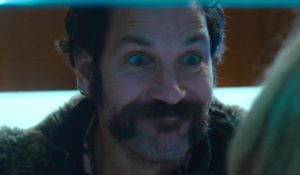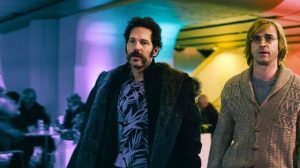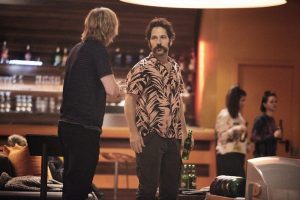Where Do We Go From Here: A Conversation That Needs To Be Had, Thanks to Mute
***WARNING: The following post contains spoilers. You have been warned.***
Let’s address the elephant in the room right now: there are a lot of people out there that really can’t stand Mute. It’s gotten panned by the critics. The Guardian managed to go so far out of its way to take personal pot shots way below the belt at director Duncan Jones that I’m not even going to give it the satisfaction of linking to it; if you disagree with a film, make your focus on the technique, not on the life of the director when it comes to profound personal losses he’s experienced in the recent past. That being said, one of the critical points I’ve heard is that the plot doesn’t handle its material as delicately as it should: the revelation in the film by Cactus Bill (Paul Rudd) that colleague and friend Duck (Justin Theroux) is a pedophile. Here’s where I’m going to disagree sharply with critics: I don’t think it’s a misguided approach to the handling of news that shattering. In fact, in the #MeToo era, I think this is a conversation we need to have so that we can better improve upon our thoughts, responses and actions moving forward.

I shit you not, Bill.
An hour and 15 minutes into the film, we get the big reveal about Duck when Cactus Bill discovers a camera in an exam room. With a heavy-looking face, he at first sighs and stands, then heads down to confront Duck. The following conversation ensues:
Bill: Stay the fuck away from my daughter. Don’t talk to her, don’t touch her, don’t even look at her. As far as you’re concerned, she doesn’t exist, got it?… I know what you are, you sick son of a bitch. I had a good idea of what was going on in Kabul too… I saw your cameras.
Duck: Fucking cameras are for patients. I use them for work.
Bill: How long has it been going on?
Duck: *stutters* I just installed them. I haven’t even recorded anybody.
Bill: *hits him* Don’t lie to me. I just saw a little girl naked on your screen. You gonna lie to me now?
Duck: I… I was… I was messing around. It was a game.
Bill: A game? No. Basketball’s a game. Tiddlywinks is a game. Bowling is a fucking game Donald! This is gonna stop right now…. The second you do something, that is a world of pain my friend.
Duck: I know.
Bill: No, you don’t. Clearly, you don’t know. Here’s what’s gonna happen. You are done treating kids. There are plenty of other doctors that can do it. No child is going to step foot in this fucking room ever again. You wanna know what else? Now I know.
Duck: What does that mean?
Bill: Means it ain’t a secret anymore. The second that you do something, or the second that I think that you’re even thinking about doing something, I am going to break your fucking arms. From your shoulders all the way down to your fingernails.
Duck: I will try. I’ll stop. I promise. I will stop. I promise. And I’m sorry. I’m sorry.
Bill: Fuck. I love you, brother. All right? I won’t let anything happen.
This conversation lasts for two minutes, but it’s loaded with so many pieces we need to fully unpack and address. Bill begins with a strong, enraged confrontation: he’s grabbing Duck’s lab coat, he’s pushing him against the wall, he’s issuing threats against the man he feels could jeopardize his child’s safety and well-being. He then expands the scenario from the immediate threat of molestation of his own daughter to nameless potential victims due to Duck’s position of being a doctor. Bill is angry and wants to take the moral stance that molesting children is bad, that even entertaining the thought is bad, and we’re with him on this. Duck, for his part, issues excuses to explain his behavior, diffuses the situation, and tries to avoid any further trouble: it was for work, it was just a goof, come on and relax because I haven’t hurt anyone, babe. However, Bill isn’t having it. Bill notes that this behavior has most likely occurred at other locations, meaning that the good doctor has been violating children on some level for a while now; it’s just that there’s proof in the form of a videotape, credible evidence that his best friend is doing something grievously wrong. Especially noteworthy: Bill does not move to turn Duck over to the police – there’s never a mention of proper authorities, in part because Bill is a shady character seeking to go underground with his daughter and disappear. So he threatens to harm Duck instead, but the punishment doesn’t go where we think it will: instead of threatening to cut Duck’s balls off (that’s where I’d go first), he threatens his arms: the two physical pieces Duck needs to maintain his livelihood. It’s not about destroying a crucial, sensitive piece of anatomy in revenge: it’s about taking away his livelihood, which is something Bill himself has benefitted from over the years. And it’s still not going to go reported to the police: Bill will harm him, but that will heal and Duck won’t be in prison. Duck will hurt if Bill follows through, but he will be able to explain away his injuries and continue once he’s healed.

Do not get in the car with this man.
This is where the tide starts to shift: Bill threatens to harm Duck, but then comes to a point of mercy and forgiveness that leaves the rest of us a mixture of shaken, angry and disgusted. Duck’s making promises at this point: he won’t act on his impulses, he’ll disable the cameras, he’ll change. Bill, for his part, hugs him and reassures Duck that everything will be okay because they’re so close. It’s treated like an illness rather than the harsh reality of the situation: Duck is a fucking predator that’s sexually attracted to children. He’s going to keep this up until he gets caught, and even then, those around him will not say anything because they’re involved in illegal operations as well. It’s a cycle wherein a predator is allowed to flourish because exposure for the greater good means that others will be dragged down too, and that risk is too large to take. It’s harder to take the moral high ground when you’re also in the gutter. So what does Bill do? He accepts empty promises. He hears the words he wants to hear: the promises of change, the agreement that he won’t go near Bill’s daughter, the hugs and tearful bonding moments that solidify years of prior history. As an audience, we turn on Bill because he’s letting someone dangerous go about unchecked with access to children – we’re informed immediately after this Hallmark moment that Bill’s going to be leaving the next night. He won’t have a way to keep an eye on Duck, which means the one person who knows this perv is macking on children is going to be totally removed from observing this person. We know why this is so disgusting: Bill thinks only of his daughter and self-serving interests, not the interests of the greater public. It could be anyone else’s kid getting victimized by Duck, and it’s okay for Bill to deny that this is going to happen because in his mind, he scared his friend straight. He talked some sense into him. He’s made sure that the wrongs are righted, his own interests are protected, and his friend has given his word that he won’t touch little girls. Cactus Bill fixed this single-handedly, guys.

I got this, guys.
People, this entire scenario is what’s wrong with the culture of sexual assault. We’re now hearing more and more that a disturbing number of women are reporting harassment at the very least, with the numbers of reported sexual assaults increasing as it becomes less stigmatized. This is a common experience, and with that comes the horrible knowledge that you most likely know someone who has harassed or assaulted someone. Furthermore, there’s a psychology of defending the perpetrator of these actions: these are good people, it’s rationalized, who just happened to make a mistake and need some love and forgiveness. It’s the denial/justification mentality that if they’re broken, your love can fix them, and they deserve compassion – which is precisely what Bill exhibits toward Duck, but with an added layer of darkness. There’s a long-standing emotional connection between the two men, and the insidious reality is that Bill is willing to brush Duck’s behavior under the carpet because a.) he’s known him for so long, b.) he’s extracted a good faith promise, and c.) as long as his daughter is protected, that’s what matters. In the end, it’s tough for Bill to say that he should be doing more to make sure that Duck doesn’t hurt anyone and truly ensuring this end; this is a character that can’t follow through on his threats because he has to be present and hold his friend accountable for more than a two-minute conversation. You can argue that Bill is trash – after all, he murders his child’s mother because he doesn’t like that mom wants to flee from her skeevy ex and his pedophile bestie – but Bill is symptomatic of a larger problem: it’s easier to take the moral high ground with strangers than it is to confront someone with whom you have an existing relationship; it’s even harder when said associate has dirt on you. It’s far easier to make the monster go away when the monster hasn’t held your hair back while you puked or held your newborn baby, then factor in that this person knows some things you’re not entirely proud of admitting publicly. The mind reels from the possibility that something nasty has occurred right under your nose, and whether the denial stems from shame or from the misguided idea that people are safer under your watch or the threat of exposure yourself, it doesn’t change the fact that someone you love has hurt another human being.

Keep coloring, sweetie. Uncle Pedo and I are talking.
It’s worth noting, by the way, that Bill’s approach doesn’t work. Bill loses focus on the fact that he just busted his friend as a pedophile when he thinks instead of his great escape and last night in town. He and Duck go bowling; they have beers; they visit a brothel. Everything seems fine, until Bill is stabbed in the throat by Leo (Alexander Skarsgård) – at this point, Duck assesses Bill’s survival rate, then turns a video monitor to display that he’s flying the coop with Bill’s daughter, all while smiling like the cat that got the cream. He actively taunts the man that should have either killed his ass or turned him over to the police. The statement here is that in showing mercy and self-medicating the problem – by refusing to full-on address Duck’s behaviors and bring him to justice – Bill ultimately gives a predator unfettered access to his daughter. Some may call that ironic, but in the real world, you bet that predators are going to become emboldened and eventually attack those who shield them. If you defend them once, chances are, you’ll keep making excuses and defend them again. These defenses increase the chances of further abuse. It’s a cycle, and one that eventually comes home to roost in your own backyard.

Never trust a man with this haircut.
Which is where we’re going to have to start challenging not only those who harass, molest and rape, but those who shelter them as well. Part of the growing dialogue of the #MeToo movement has been identifying the issue that these predators move freely about due to the culture of acceptance. It’s admitting that we need to discuss how prevalent abuse is on a global level, and what factors have helped and hindered progress. We’re working on changing that culture, and rightfully so. The next step is one that doesn’t have an easy answer: we also need to figure out how to address those who are caught, and the mental and legal ramifications for those who associate with them and try to defend them. Listen, I get it – when you care, you want to be a good friend; we’re raised to believe that good people stick by their friends no matter what. While that’s all well and good, the other side of the coin is that you don’t want to believe that you let someone like that into your life, and so the defenses go up. It’s anger at yourself as much as it’s anger at the other person and the situation. These are feelings with which more and more individuals need to contend, and there are no easy answers, especially when we start thinking about the next steps. How do we prevent this from turning into a hierarchy of abuse? How do we gauge an appropriate level of atonement? How can we tell what’s genuine apology versus crocodile tears and lip service? Can support coexist with condemnation for actions? How do we support the community in recognizing that shielding someone who has done something wrong doesn’t help? How do we move together as a team to tackle something this large and ugly? How do we look at ourselves and say, “I feel badly that something like this happened. I want to help. I need help reconciling feelings of guilt and disgust with the person I know and my own sense of responsibility. I never want this terrible thing to happen again.”? How do you build up that type of strength? I don’t know the answers to these questions. I really wish I had them; truly, I do. Coincidentally, I’d love to talk to actor Robert Kazinksky, who’s been on both ends of the harassment spectrum and is a frequent collaborator with Jones. I’d love to pick both of their brains about the subject.

While some may decry Mute as inappropriately tackling a hefty piece of subject matter, I feel that it exposed a common problem from which we’re currently reeling: how do we handle a sexual predator when that person is someone with whom we’re close, especially when we’re imperfect beings? I’m not defending Duck at all – quite the contrary, I want to know how to make it more difficult to be persuaded by a loved one who promises change only to turn around and bite that same helping hand. I want to make sure that other people know how to address a Duck so that the kids of the world are safe. I want greater understanding so that we can move ahead and do the right thing, even when it’s difficult – even when it means severing longstanding professional and personal relationships. It’s a tough conversation to have, and one that’s overdue. However, great difficulty often brings about change; it’s how you choose to meet it that determines the integrity of your character. This is the true thing about Mute that makes us uncomfortable: it’s the presence of a person who turns a blind eye to an obvious atrocity in the name of denial and self-interest. It’s something we don’t want to see. It’s too close to home right now.

This article is Absolutely spot on.
The critics that dissed the film didn’t bother to watch the film properly or didn’t really want to understand what Mr Jones was saying.
The film highlights the dilemmas people face when dealing with loved ones who commit crimes against children. It seems that ,Sometimes ,it’s easier to ignore than to rock the boat In their own world.
Brilliant film x
Great analysis. Very true. People often don’t fully take responsibility for something like that because of their own misdeeds, imagined or real and fear of their own exposure. Sometimes with full awareness and sometimes more subconsciously.
I think viewers wanted to watch a sci fi movie. They wanted to find out what happened to the protagonist’s girl and they were perhaps lulled into liking the M*A*S*H-style doctors. I don’t think viewers wanted or expected a film about paedophilia.